|
|
|
Sort Order |
|
|
|
Items / Page
|
|
|
|
|
|
|
| Srl | Item |
| 1 |
ID:
132215
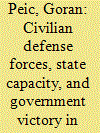

|
|
|
|
|
| Publication |
2014.
|
| Summary/Abstract |
Given the onset of a violent rebellion by an armed non-state group, how do states re-establish intra-state peace and hence fulfill their basic function as providers of internal security? In this article I argue that one way governments perform this core function is by recruiting non-combatants into local self-defense units called civilian defense forces (CDFs). By providing for local security, leveraging their superior local knowledge, and provoking insurgent reprisals against civilians, CDF units facilitate the influx of tactical intelligence as well as isolate insurgents from non-combatant populations physically as well as politically. Consistent with the argument, statistical analyses of two different cross-national data sets of insurgencies from 1944 to 2006 reveal that a state is 53 percent more likely to vanquish a guerrilla threat if the incumbent deploys CDFs. The analyses also cast doubt on a recent claim in the literature that incumbent force mechanization adversely affects the states' ability to counter insurgent threats. Given that CDF deployment is a more easily manipulable variable than most other elements of state power, CDFs appear to be an effective instrument of counterinsurgency deserving of further academic and policy attention.
|
|
|
|
|
|
|
|
|
|
|
|
|
|
|
|
| 2 |
ID:
132214
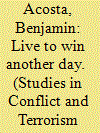

|
|
|
|
|
| Publication |
2014.
|
| Summary/Abstract |
Militant organizations pursue two common aims: to survive and to achieve the goals that define their raison d'être. Yet, elements that sustain the life spans of militant organizations are not necessarily the same components that advance the accomplishment of their core, or "outcome," goals. Further, some organizational practices, such as the use of suicide attacks, generate a tradeoff that bolsters survivability while detracting from the effective pursuit of outcome goals. This study demonstrates that three operating conditions explain variation in the duration and achievement of contemporary militant organizations: receptiveness to tradeoffs, levels of external support, and the nature of adversaries. As such, the unique effects of different operating conditions reveal why many militant organizations survive for long periods of time but only a few achieve the goals that justify their existence.
|
|
|
|
|
|
|
|
|
|
|
|
|
|
|
|
| 3 |
ID:
132217
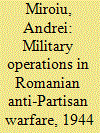

|
|
|
|
|
| Publication |
2014.
|
| Summary/Abstract |
Romanian anti-communist armed resistance has received relatively little attention outside the country, despite its resemblance to other small, diffused, headless insurgencies being fought in the first decades of the twenty-first century. This article deals with military operations mounted against the partisans, with a special focus on tactics such as cordoning, checkpoints, patrols, sweeps, ambushes, and informed strikes. Based mostly on primary sources, it highlights success and failure against determined and elusive guerrillas.
|
|
|
|
|
|
|
|
|
|
|
|
|
|
|
|
| 4 |
ID:
132213
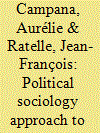

|
|
|
|
|
| Publication |
2014.
|
| Summary/Abstract |
This article seeks to foster a better understanding of the diffusion of conflict in the North Caucasus. We argue that diffusion of conflict is a dynamic and adaptive process in which outcomes are shaped by the intersection of three social mechanisms-attribution of similarity, brokerage, and outbidding-and the political, social, and religious contexts. We suggest that a distinction should be made between horizontal and vertical processes of diffusion. We also approach the empirical diffusion of conflict from a different perspective, showing that non-Chechen actors have played a key role in both the diffusion process and its outcomes.
|
|
|
|
|
|
|
|
|
|
|
|
|
|
|
|
| 5 |
ID:
132220
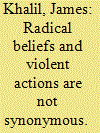

|
|
|
|
|
| Publication |
2014.
|
| Summary/Abstract |
This article develops and elaborates on three core points. First, as with research into other social science themes, it is argued that it is necessary to apply the logic of correlation and causality to the study of political violence. Second, it highlights the critical disjuncture between attitudes and behaviors. Many or most individuals who support the use of political violence remain on the sidelines, including those who sympathize with insurgents in Afghanistan (reportedly 29 percent in 2011), and those supportive of "suicide attacks" in the Palestinian Territories (reportedly reaching 66 percent in 2005). Conversely, those responsible for such behaviors are not necessarily supportive of the ostensible political aims. Third, it is argued that the motives that drive these attitudes and behaviors are often (or, some would argue, always) distinct. While the former are motivated by collective grievances, there is substantial case study evidence that the latter are commonly driven by economic (e.g., payments for the emplacement of improvised explosive devices), security-based (i.e., coercion) and sociopsychological (e.g., adventure, status, and vengeance) incentives. Thus, it is necessary for the research community to treat attitudes and behaviors as two separate, albeit interrelated, lines of inquiry
|
|
|
|
|
|
|
|
|
|
|
|
|
|
|
|
|
|
|
|
|